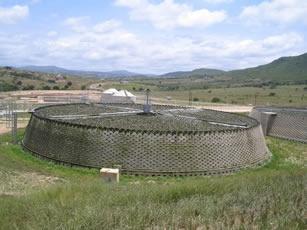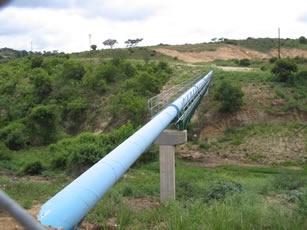Zimbabwean Muchadeyi Masunda has a water problem: none comes to his house.
The pipes are dry. It’s not that he lives in some parched rural backwater. His home is in Harare’s up-scale suburb Chisipite.
“Some of my neighbours have water, but we have been without water for some time now,” Masunda told the press.
Mr. Masunda is the Mayor of Harare. If he should borrow Bill Clinton’s catch phrase and tell his waterless constituents, “I feel your pain,” the mayor would have more credibility than the legions of politicians who have promised to fix any African city, province or nation’s water woes.
Providing clean water to rural and poor Africans is an ongoing task and the subject of an annual ministerial water summit, but water shortages known to most urban areas are critical because the lack of water is hobbling economic development. From informal settlements to swank suburbs, to industrial users and agriculture, the scramble for water is a perennial condition of life in today’s Africa. But despite predictions of climate change-driven droughts on the horizon, water shortages are not unsolvable. Sometimes solutions are as simple as changing the piping. That’s what is required to get water to Mayor Masunda’s house.
But as the participants at the African Ministers' Council on Water (AMCOW), held in Johannesburg in November 2009, agreed, what is needed it political will and cash investments.
Investment activity
A quick tour of the continent finds such investments happening. Most water delivery projects seem to be done to address long-festering crises. Water service delivery improvements are put off as populations grow until water shortages threaten lives. Existing systems in place since Colonial times are allowed to rot until lack of basic water services make a mockery of the gleaming new large-scale projects like airports and highways that governments prefer for their prestige than investments in infrastructure improvements.
In October the Harare City Council ordered the replacement of large sections of leaking pipes that are a cause of the capital city’s water shortages. Even so, there is not enough water to deliver. The city uses 1,000 megalitres per day. Harare’s two water treatment plants, the Morton Jaffray and Prince Edward Water Works, pump out a combined 714 megalitres daily. The rest comes from any source available to users, from streams to harvested rain runoff.
To pay for waterworks expansion, Harare’s City Council in July voted to cease water service to users whose unpaid accounts amounted to US$32mn. The council may not see delinquent customers settling their accounts, but will save on providing further service until they do.
In the 1980s, Kenya launched a water services expansion campaign that promised “Water for All by 2000”. As the country enters the new century’s second decade, Nairobi residents and commercial water users are increasingly digging their own backyard wells in an attempt to secure some sort of stable water supply, albeit of problematic quality. What is worrying to conservationists is the effect multiplying boreholes, which plunge from 45m to 100m underground, will have on the aquifers of Harare and surrounding farmland, where water-poor farmers are also drilling.
However, Prime Minister Raila Odinga assured Kenyans that his government is stepping up water supply projects. Speaking at the launch of ten water tanks that will be located throughout the country, the premier said, “Water is among the key projects that are at the centre of the development programme of the country and as a government we are committed to ensure that the water shortage in the country is adequately addressed.”
Cleaning the system
In Uganda, corruption is undermining water security. A government probe found that water department workers demand bribes to connect pipes and inflate usage figures when reading metres, with the resulting illicit earnings disappearing. With only six out of ten Ugandans accessing clean water, government has responded by enacting reforms, including an independent regulator to monitor service delivery.
Significantly for the residents and commercial entities of Kampala, a multi-million rehabilitation project will replace the city’s 30 year-old sewage system with a new one at suburban Kinawataka. 38mn euros are being made available as a soft loan from the African Development Bank, and an additional 7mn euros will come as a grant from the German government. Uganda’s government will pay 16m Euros, pending parliamentary approval. Seeking MPs support to overcome a potential health threat, a government report distributed to parliamentarians indicated that only a fraction of the Kampala population (7.5 per cent) are connected to the city’s sewerage system.
Meanwhile, to address a concern that cholera might spread through the city’s informal settlements as residents pull water from polluted streams, government has installed a pre-paid water system at Kagugube Parish, and is paying the water bills for 30,000 residents who will draw water from 100 communal faucets.
Water users in Angola’s capital will see some improvement in service when a new water treatment plant for Luanda is completed in 2012, at the cost of US$3mn.
Sediment build up because of improper or neglected maintenance is bedeviling water systems throughout Africa. In Niger, the Commissioner for Water Resources announced water rationing as a temporary measure while eight reservoirs at Tagwai Dam are cleaned and the dam and intake channel are dredged. After the maintenance, water will flow dependably for at least 12 hours a day; a significant improvement from the frequent water cut-offs currently experienced by users.
In Nigeria, water service schemes are underway courtesy of a Japanese government grant in the Longido District, where drought is threatening cattle and human life.
Starting in May 2010, water treatment plants will be constructed to service Arusha, and upon completion all city and suburban residents are promised a clean and reliable water supply. Further afield in the Plateau State, a water project begun by a previous provincial government will continue, the newly-installed government announced. There was some fear that the project would be cut by the new administration.
When African heads of state met last year at the African Union Summit, their joint declaration announced, “There is an under-utilisation and uneven sharing of water resources in Africa, and that remains a growing challenge in the achievement of food and energy securities.”
Beyond instituting an annual Africa Water Week, no continent-wide initiatives have been forthcoming. The Africa Water Week is intended to publicise the need for clean and bountiful water. But the African people are well aware of this need. What they want is more water infrastructure investment.
James Hall





















